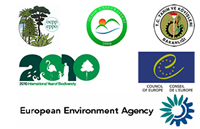
2nd International Workshop
Invasive Plants in the Mediterranean Type Regions of the World

2010-08-02/06, TR, Trabzon
The Workshop, co-organized by the University of Igdir and The Turkish Ministry of Agriculture was held in Trabzon (Turkey), from 2 to 6 August 2010. It was attended by more than 90 participants from 29 countries (Australia, Armenia, Azerbaijan, Bulgaria, Chile, Croatia, Czech Republic, France, Greece, Hungary, India, Iran, Israel, Italy, Lithuania, Malaysia, Morocco, Portugal, Saudi Arabia, Serbia, Slovakia, Slovenia, South Africa, Sudan, Syria, Switzerland, Tunisia, Turkey, UK, USA). Experts from the other Mediterranean Type Regions of the World (Northern Chile, California, the Cape Region of South Africa, and Western Australia) presented their experience with invasive species. The workshop consisted in plenary sessions and small working groups, allowing participants to network and to discuss current and future projects. The conclusions of all small working groups will soon be available. A 3rd workshop on the same topic should be organized in 2014 in Tunisia.

Participants - View more pictures ![]()
PRESENTATIONS
- Opening speeches
Flora of Turkey: Richness, updates, threats - Mr Necmi Aksoy, Turkey
Impacts of global change on plant life in the Mediterranean region and the spread of invasive species - Prof. Vernon Heywood, UK
New mechanisms invasive alien plants might employ for their success - Prof. Inderjit, India
Invasive Weeds threats and strategies in Gangetic inceptisols of India - Prof. Ratikanta Ghosh, India
Niche modeling in invasive plants: new insights to predict their potential distribution in the invaded areas - Prof. Ramiro Bustamente, Chile
Bern Convention on invasive alien plants, the Code of conduct on horticulture and invasive alien plants - Mr Eladio Fernandez-Galiano, Council of Europe
EPPO activities on Invasive Alien Plants - Ms Sarah Brunel, EPPO
Role of the European Food Safety Authority in risk assessment of invasive species potentially harmful to plants - Ms Sara Tramontini, EFSA
Towards an early warning and information system for invasive alien species (IAS) threatening biodiversity in Europe - Mr Riccardo Scalera, IUCN
European Environment Agency: Activities addressing invasive alien species - Mr Ahmet Uludag, EEA
Results of the survey on invasive alien plants in Mediterranean countries - Mr Giuseppe Brundu, Italy, Mr Guillaume Fried, France, Ms Sarah Brunel, EPPO.
- Section 1:Plant invasions in the Mediterranean: where do we stand?
One fall all or all for one? Evidence for cryptic invasions by multiple sub-species of the Port Jackson Willow (Acacia saligna) - Ms Geneviève Thompson, South Africa
Prioritization of potential invasive alien species in France - Mr Guillaume Fried, France
Forecast of further distribution of some invasive and expansive plant species in Armenia - Mr George Fayvush, Armenia
Noxious and invasive weeds in Greece: current status and legislation - Mr Petros Lolas, Greece
A tale of two islands: comparison between the exotic flora of Corsica and Sardinia - Mr Daniel Jeanmonod, Switzerland, and Mr Giuseppe Brundu, Italy
New species threatening Moroccan biodiversity: Verbesina encelioides (Asteraceae) - Prof Abdelkader Taleb, Morocco
- Section 2: Early warning
Stages in the Development of an Early Detection and Rapid Response (EDRR) Program for Invasive Plants - Mr Kassim Al-Khatib, USA
Establishment of a National early detection and rapid response programme - some early lessons - Mr Philip Ivey and Ms Hilary Geber, South Africa
The NOBANIS gateway on invasive alien species and the development of a European Early Warning and Rapid Response System - Ms Melanie Josefsson, Sweden
From mediocrity to notoriety - the case of invasive weedy rice (Oryza sativa L.) in Malaysian rice granaries - Mr Baki Bakar, Malaysia
Eradication and monitoring of Australian Acacias in South Africa as part of an EDRR program, can species with long-lived seed banks be eradicated? – Mr John Wilson, South Africa
Should Melaleuca be an eradication target in South African fynbos? Looking beyond population data - Mr Ernita Van Wyck, South Africa
- Section 3: Communication, policies & strategies for tackling invasive alien plants
Code of conduct on horticulture and invasive alien plants - Prof. Vernon Heywood, UK
Industry view on importance and advantages of a Code of Conduct on horticulture and invasive alien plants - Mr Anil Yilmaz, Turkey
Effectiveness of policies and strategies in tackling the impacts on Invasive Alien Species on biodiverse Mediterranean ecosystems in southwest Australia - Ms Judy Fisher, Australia
Combining methodologies to increase public awareness about invasive plants in Portugal - Ms Elisabete Marchante, Portugal
Outcomes of the Tunisian experience on farmer field school management of Silverleaf nightshade - Mr Mounir Mekki, Tunisia
Legislative, biological and agronomic measures to comply with the Bern Convention recommendation n141/2009 on "Potentially invasive alien plants being used as biofuel crops" by Contracting Parties in the Mediterranean Basin - Mr Roberto Crosti, Italy
Biomass crops in the Mediterranean: can experiments in Languedoc Roussillon help characterize the risk of invasiveness of the plants used? - Mr Pierre Ehret, France
- Section 4: Management of invasive alien plants
Management of alien plant invasions: the role of restoration - Insights from South Africa - Ms Mirijam Gaertner & Mr Dave M Richardson, South Africa
A large-scale project of invasive plant coenosis control in Mediterranean sand coastal area: two case studies and a model to standardize the management criteria - Mr Antonio Perfetti, Italy
Three tools to manage exotic weeds in Swiss agricultural and non-agricultural environments - a proposal - Mr Christian Bohren, Switzerland
Biology and control of the invasive weed Heterotheca subaxillaris (camphorweed) - Ms Mildred Quaye, Israel
Mesquite (Prosopis juliflora): A threat to agriculture and pastoralism in Sudan - Mr Abdel Gabar T Babiker, Sudan
Is biological control of the invasive weeds Ambrosia spp. a dream? - Mr Tuvia Yaacoby, Israel
